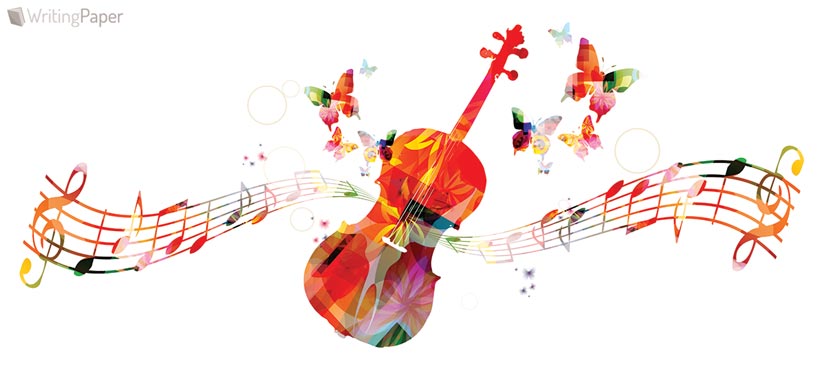
Country, western swing, free jazz, blues, house, noise, rock and roll, power pop, jazz rock, punk rock, ska, reggae, disco, jazz-rap, etc. – for today, there are 17 musical genres and several hundred subgenres, but despite such diversity, each of them has its own admirers.
On the question "What is the role of music in human life?" There are many answers. Today we propose you to familiarize yourself with a number of new scientific studies that have shed light on yet another little-known aspect, the influence of music on the work of the brain.
Can Music Make Us Happier?
According to the American music theorist Jerrold Levinson, the language of music as a subject of linguistics is no less expressive system of communication than ordinary human language.
Since music carries a much more powerful emotional charge than real life events, modern psychologists are increasingly resorting to the use of music therapy. It is possible to explain its positive influence on a person's condition at least by the fact that the reactions of our nervous system to cheerful and sentimental musical works are completely different. For example, participants of a recent experiment, having listened to a short composition, interpreted a neutral facial expression as happy or sad depending on which melody they heard.
Emotions that have arisen under the influence of music can be divided into two types: perceived and experienced. It means that a person is able to understand the mood of a musical work, even if he or she has never experienced such feelings in real life. So, under psychological disorders of a depressive nature, joyful music only aggravates a person's condition, whereas sad motives, on the contrary, bring back bright colors into the life.
How Does Background Noise Affect Creativity?

In order not to go out of your head due to boredom while working upon some painfully familiar task – for performing of which you may get a solid material reward – you put on headphones, set the necessary volume, select the proper playlist, and press the "play" button, isn’t it? Be that as it may, when it goes about work that requires the activation of the right brain hemisphere, loud music is unlikely to help.
As it turned out, the average noise level is a kind of catalyst for creativity. Complicating the process of information processing, background noise stimulates abstract thinking and adjusts the human brain to a creative working mode. That is why public places – cafes, summer areas, embankments, parks, etc. – are so attractive to creative personalities.
At a high noise level, the human brain is too congested, as it tries not only to abstract from all distractions, but also to process information as qualitatively as possible.
Is It Possible to Determine the Character of a Person, Knowing Musical Preferences?
The results of this study, conducted by the scientists of Heriot-Watt University (HWU), for the first time proved that there was a definite dependence between the musical genres preferred by the person and his/her character.
In the first part of the experiment, 36,518 young people from all over the world had to rank 104 musical genres according to their personal preferences. The next stage of the study was somewhat more complicated: The participants had to break into pairs and try to determine the character traits of their partners based on their list of the 10 most audible tracks. For the analysis, five qualities were selected: openness to new experience, extraversion, politeness, conscientiousness, and emotional balance.
The scientists came to the following conclusions:
- Blues fans are creative, sociable, polite, and arrogant;
- Among jazz lovers, creative and friendly people with overestimated self-esteem are more often found;
- Fans of classical music refer to the introverted type of personality, but despite this, they have a high sense of dignity and outstanding creative abilities;
- Fans of rap are sociable and slightly selfish;
- To the number of fans of the opera belong polite, open, creative personalities;
- Fans of country and western are distinguished for their diligence and ability to find easily a common language with others;
- Reggae fans have a high self-esteem, are creative and sociable, but hard work is definitely not about them;
- Lovers of rhythmic dance music belong to the extrovert type of personality, have certain creative abilities, but do not differ by good manners;
- Indie fans have a low self-esteem, they are not hardworking and are often poorly educated;
- Fans of Bollywood (music from Indian films) are very responsive and friendly;
- Very often fans of heavy music - heavy metal, hardcore, etc. - understated self-esteem, but they have great creative potential.
Is There a Connection Between Music and Logic?

As you know, learning to play the musical instruments at an early age has a beneficial effect on the child's further development. In 2008, Marie Forgeard, Ellen Winner, and Andrea Norton, professors at the University of St. Andrews, found that children who are engaged in music for about three years surpass their peers at once in four indicators: Perception of the information on hearing, motor skills, vocabulary, and logical thinking.
Thus, scientists came to the conclusion that long-term intensive musical practice has a positive influence not only on the interhemispheric organization of auditory and motor functions but also on the process of redistribution of mental functions between the left and right hemispheres of the brain (lateralization).
How to Make Training More Productive?
Scientists have been already for many years investigating the influence of music on the process of physical training. For example, in 1911, American scientist Leonard Ayres found that the cyclists pedal much faster listening to rhythmic music than when traveling in silence.
It happens because the music simply muffles up the signals of fatigue. The body, feeling physical exhaustion, sends to the brain the corresponding impulses that the muscles need time to regain strength. Music, in turn, predetermines such signals and motivates a person to engage in longer. It should be noted that the musical accompaniment is especially useful during training with low or moderate intensity because it is almost impossible to ignore the pain that occurs during heavy loads.
Musical accompaniment also helps a person to dispose of his/her energy reserve in the most effective way. A study conducted in 2012 showed that cyclists who listen to music during training, consume 7% less oxygen, despite the fact that the load remains unchanged.
As you can see, the world of music is full of secrets to reveal. Nevertheless, you can benefit from music accompaniment already today being aware of facts listed in this article.
